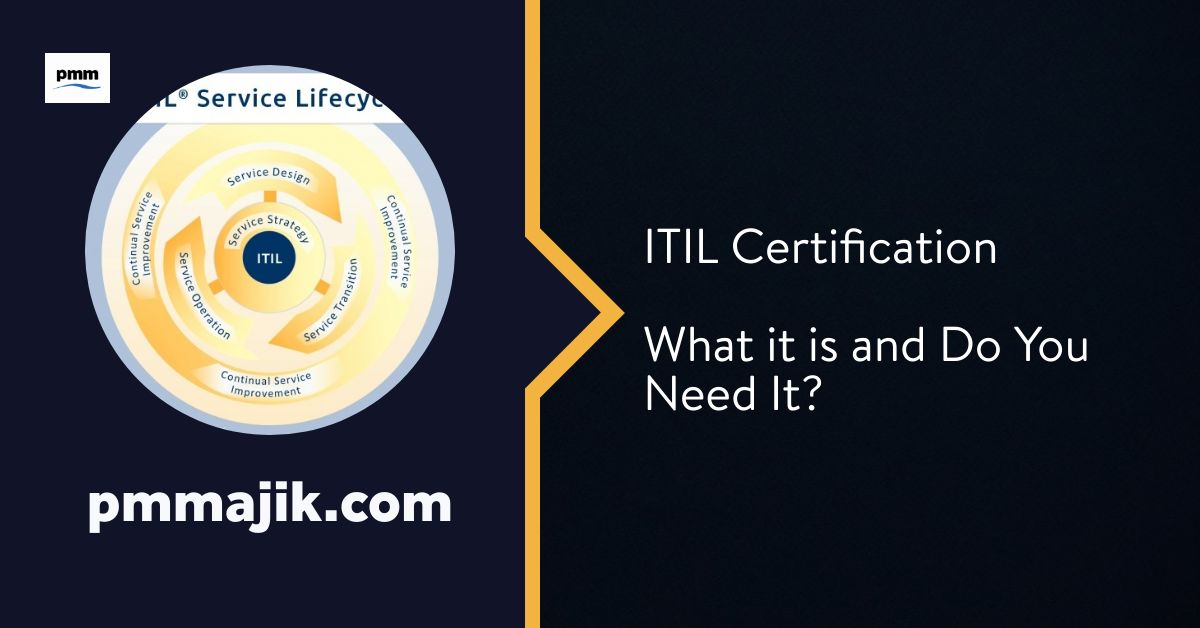If you work in IT projects or within a company that has a strong IT base, you’ll probably have heard of ITIL. When you work leading a project management office (PMO), do you need to take the ITIL certification? We answer that, and more, here.
It’s important to note at this juncture that ITIL is very much focussed on the IT industry and isn’t specifically a project management framework. It’s aimed at IT services delivery, which can be the nature of a lot of projects and there is a lot within ITIL that is valuable for running a PMO in this field.
We’re covering it here because it may be worth investing in if you are in an IT PMO and looking for a way to differentiate yourself when applying for roles. The details that’ll be covered are:
- Where the ITIL certification comes from
- What you need before you start
- What you learn along the way
- The advantages and disadvantages of the ITIL certification
So you decide if it’ll add value to your career.
Who certifies ITIL?
ITIL is certified by AXELOS, which is company run as a partnership between Capita and the UK government.
ITIL stands for “IT information library” and is a comprehensive scheme of certifications that teaches about IT service delivery and management. Depending on the type of IT projects you deliver, this can be very relevant to your PMO, for example if your projects deliver bespoke services to your clients.
What are the costs and requirements for the ITIL certification?
There are four levels of certification in ITIL which progress through the basics, to leadership, strategy, and full implementation of the framework.
- The first level is ITIL Foundation. You can do this certification as self study or in a classroom, with in-person study taking around two and a half days. For a classroom course, expect to pay around £270.
- Next is ITIL Managing Professional, which requires you to complete the foundational training first. There are four streams of study which you can do in one long course or broken down; expect to pay roughly £1,100.
- ITIL Strategic Leader follows, and you again need to have completed the foundation level. There are two modules to study and the price should be around £1,700.
- The final stage is ITIL Master, which isn’t an exam but an assessment on a topic of your choice. You need five years experience in IT service management and to have the other three certifications.
These certifications don’t need renewing; they’re valid for the rest of your professional career.
What will I learn with ITIL certifications?
ITILS is about measuring and improving the quality if IT services. This can be directly applicable to your IT-based PMO since you want to ensure that projects that deliver IT services are being well-delivered.
A primary focus of the strategic leadership training is the ensure that IT services align with business needs. This is very much in the scope of your PMO.
What are the pros and cons of ITIL certifications?
Pros of ITIL certification
- It’s offered by AXELOS which is globally recognised and accepted as a certifying body
- You get a detailed, methodical, clear path to delivering IT projects
- It requires a lot of investment in terms of time, making it a strong addition to your CV
Cons of the ITIL certification
- ITIL isn’t a universally used framework so it’s not as transferrable as other project management certifications
- Getting fully certified can be a costly and time-consuming experience
The take-home
As a PMO, you’ll have a lot of questions about the ITIL certification and whether it’s the right set of courses for you to take. If you work in a PMO that’s all about IT and your projects work on delivering new services to clients, this should be worthwhile.
Further, if you go into a business where many or all of the project managers have ITIL, it will be worth getting to grips with it so you can understand how they’re delivering the projects you monitor.
Research your field in detail and understand how common ITIL is used in the country you’re in and the types of company you envisage working for. This will give you a clear indication if it’s worth the effort to invest.





